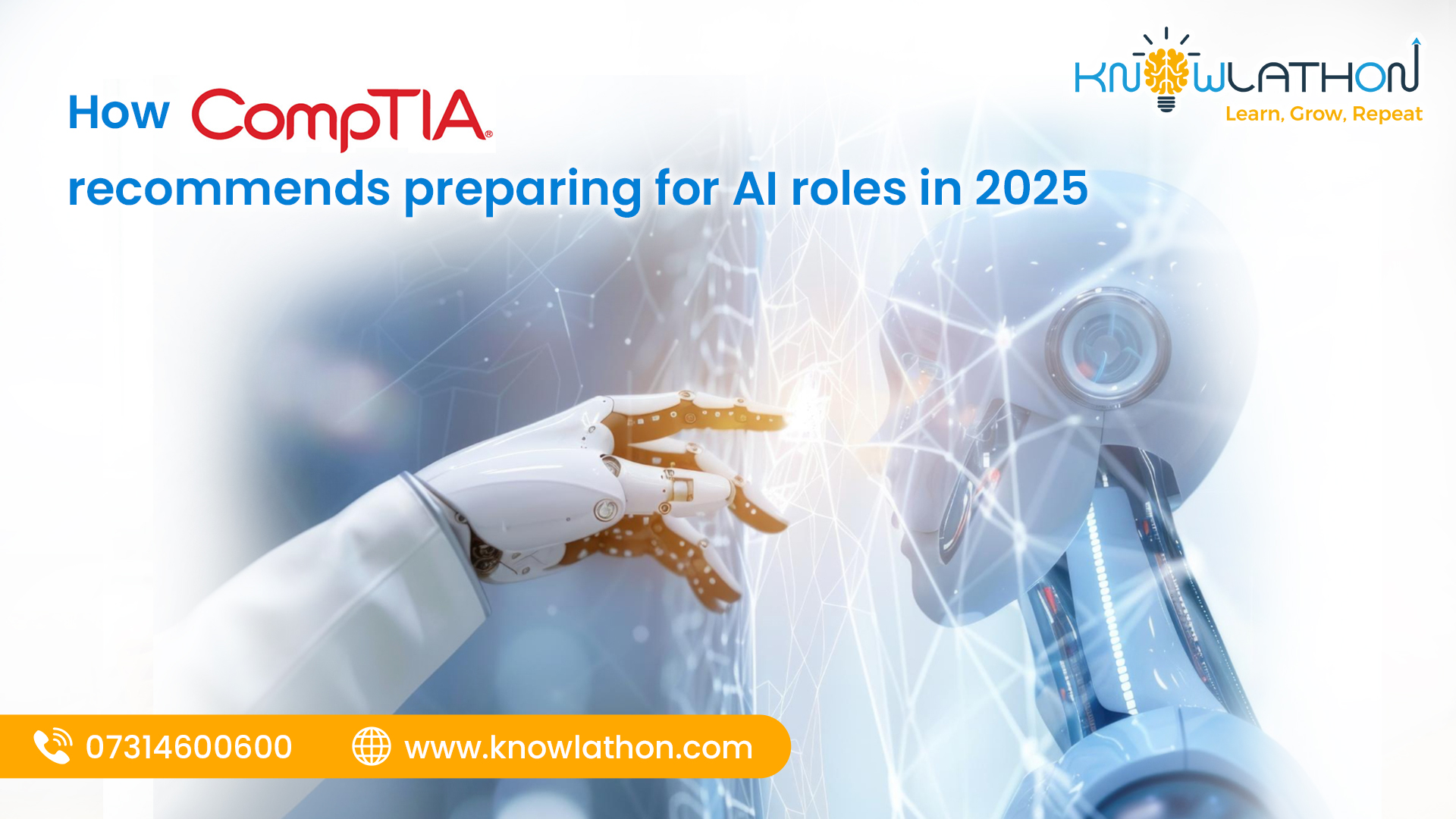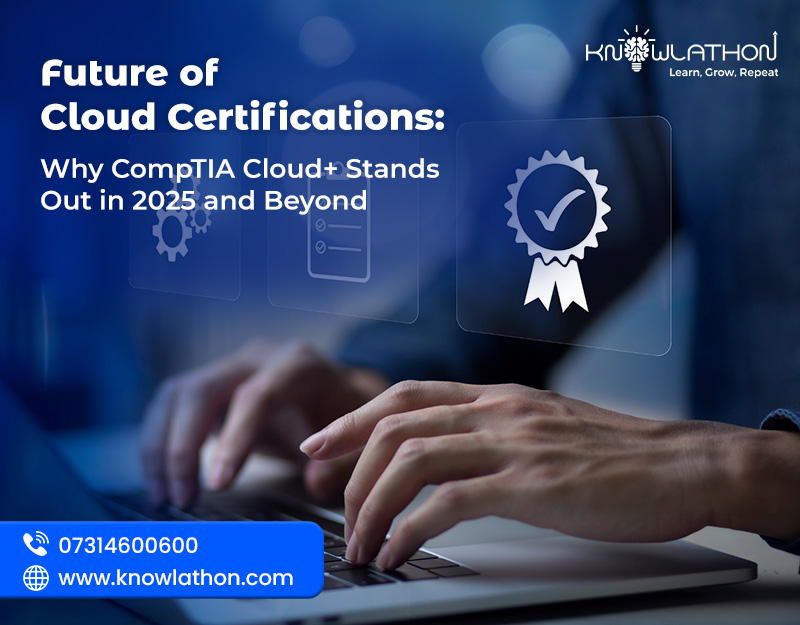How CompTIA recommends preparing for AI roles in 2025

As we step into 2025, artificial intelligence isn't just a buzzword—it's reshaping industries, automating workflows, and creating high-demand careers that blend technology with human ingenuity. According to recent reports, AI-skilled professionals are less likely to face layoffs, with companies prioritizing reskilling to harness AI's potential. For IT pros, marketers, analysts, and aspiring tech leaders, the question isn't if to dive into AI, but how to do it strategically. Enter CompTIA, the nonprofit association powering IT career growth worldwide. With its expanded CompTIA AI roadmap, CompTIA offers a clear, actionable path to build AI fluency and land roles like AI cloud engineers, prompt engineers, and cybersecurity AI specialists.
CompTIA's AI Product Roadmap: A Six-Domain Blueprint for 2025
CompTIA's AI expansion, announced in early 2024, covers six critical domains: software development, cybersecurity, systems operations (SysOps), data analytics, prompt engineering, and AI systems architecture. This CompTIA AI roadmap is divided into two series: the Essentials Series for beginners and the Expansions Series for advanced, role-specific expertise. It's designed to address the AI skills gap, with 85% of IT leaders citing a need for more AI training in their teams.
The roadmap starts broad and narrows to specialized paths, aligning with job clusters where AI boosts efficiency—like threat detection in cybersecurity or predictive analytics in data roles. By 2025, CompTIA predicts AI will transform 70% of IT jobs, making this structured progression essential for staying relevant. No more siloed learning; CompTIA integrates AI into existing certifications like Security+ and Data+, creating hybrid credentials that validate real-world application.
Key CompTIA AI Certifications for 2025: Your Entry Tickets
Certifications are the cornerstone of CompTIA AI certification 2025. They're vendor-neutral, affordable (starting at $100-200 per exam), and globally recognized, making them ideal for bootstrapping your AI journey. Here's a rundown of the top ones:
1. CompTIA AI Essentials: The Foundational Launchpad
Launched in January 2025, CompTIA AI Essentials is your beginner-friendly gateway to AI literacy. This self-paced course (6 hours) demystifies AI basics: what it is, generative AI tools like ChatGPT, prompt engineering, ethics, privacy, and human-AI collaboration. No prerequisites—perfect for IT newbies or non-tech pros.
Preparation Tip: Dive into hands-on labs on ethical AI use and future trends. End with a CompCert assessment for a digital badge. Benefits? It equips you to spot AI opportunities in your current role, like automating reports, boosting productivity by 30-40% in early adopters.
2. CompTIA AI Prompting Essentials: Mastering the Art of AI Interaction
Prompt engineering is the "secret sauce" of 2025 AI roles, and CompTIA AI Prompting Essentials nails it. This 6–8-hour course teaches crafting precise prompts for tools like generative AI, evaluating outputs for bias, automating tasks, and ethical integration. It's for everyone—from project managers to developers—requiring zero prior experience.
How to Prep: Practice with real scenarios, like refining chatbot responses for customer service. Earn your CompCert and watch your workflow efficiency soar. In 2025, prompt pros command 15-20% higher salaries in roles like AI implementation specialists.
3. Advanced Expansions: Tailoring AI to Your Domain
For mid-level pros, the Expansions Series builds on core certs:
- SecAI+ (Beta in 2025): Expands Security+ with AI-driven threat detection and response.
- Data AI+: Pairs with Data+ for AI-powered analytics.
- AI SysOp+ and AI Architect+: For ops and architecture roles, focusing on scalable AI deployments.
These are launching throughout 2025, prioritizing cybersecurity due to rising AI-enabled threats. Prep by stacking on your existing CompTIA creds—think Security+ first, then SecAI+.
In enterprise settings, these certs shine: AI Essentials for broad teams, Data+ for analysts, and CySA+ for securing AI systems. Together, they prepare you for top AI skills for professionals, like NLP and ethical deployment, directly tying to business outcomes.
|
Certification |
Level |
Duration |
Key Focus |
Ideal For |
|
AI Essentials |
Beginner |
6 hours |
AI basics, ethics, generative AI |
IT entry-level, non-tech pros |
|
AI Prompting Essentials |
Beginner |
6-8 hours |
Prompt crafting, automation |
All roles needing daily AI use |
|
SecAI+ |
Intermediate |
Varies |
AI in cybersecurity |
Security engineers |
|
Data AI+ |
Intermediate |
Varies |
AI analytics |
Data analysts |
The CompTIA AI Learning Path: Step-by-Step to Proficiency
CompTIA's CompTIA AI learning path is a flexible, modular journey: Start with Essentials for fluency, add Prompting for practical tools, then specialize via Expansions. It's self-paced, with quarterly roadmap reviews to adapt to trends like multimodal AI.
Step 1: Assess and Build Foundations Conduct a skills audit—CompTIA's free tools help identify gaps. Enroll in AI Essentials to grasp concepts like AI evolution and job impacts.
Step 2: Gain Hands-On Fluency Tackle AI Prompting Essentials. Experiment with open-source tools (e.g., Hugging Face) for projects like chatbots. CompTIA stresses a "fail-fast" mindset: Prototype, iterate, learn.
Step 3: Specialize and Certify Choose domain-specific expansions. For cloud-heavy roles, layer in AWS/Azure AI certs. Track progress with badges and portfolios showcasing ROI, like reduced task times.
Step 4: Continuous Upskilling In 2025, AI evolves fast—refresh quarterly. CompTIA's ecosystem integrates with IT staples like Network+ for AI-ready infrastructure.
This path isn't linear; it's adaptive, blending tech (Python, MLOps) with soft skills (storytelling, ethics). Result? You're not just certified—you're deploying AI that drives 20-30% efficiency gains.
Top AI Skills for Professionals: CompTIA's Must-Haves
CompTIA identifies top AI skills for professionals as a mix of technical prowess and human-centric abilities:
- Technical: Python proficiency, statistics, cloud platforms (AWS, Azure), MLOps for deployment.
- AI-Specific: Prompt engineering, generative AI application, bias mitigation.
- Soft: Business acumen (linking AI to ROI), communication (explaining AI to execs), adaptability.
For preparing for AI roles with CompTIA, focus on transferable IT skills—data handling from Data+, security from CySA+—then infuse AI. In 2025, roles like AI product managers will demand ethical storytelling to navigate uncertainty.
CompTIA AI Courses Online: Accessible Training for Busy Pros
CompTIA AI training and CompTIA AI courses online are game-changers—affordable, on-demand, and mobile-friendly via the CompTIA Learning platform. Options include:
- Free webinars on AI ethics.
- Bundled paths with video labs ($200-400).
- Corporate programs for teams.
Enroll today at comptia.org—many complete in weeks, fitting around full-time jobs. Pro tip: Pair with free resources like Kaggle datasets for portfolio-building.
Your AI Career Roadmap 2025: From Novice to Leader
Crafting an AI career roadmap 2025 with CompTIA? Here's the blueprint:
- Month 1-2: AI Essentials + Prompting certs. Build fluency.
- Month 3-6: Domain expansion (e.g., SecAI+). Launch a project.
- Ongoing: Portfolio, networking (CompTIA events), job hunt for AI engineer roles (avg. salary $120K+).
Success stories abound: IT admins transitioning to AI SysOps via this path, landing 25% raises. Remember, AI amplifies humans—CompTIA ensures you're the one steering.
In 2025, ignoring AI isn't an option; mastering it with CompTIA is your edge. Start with AI Essentials today, and transform your career. What's your first step? Share in the comments!





